Business Communication: Theories, Barriers, and Travel Strategies
VerifiedAdded on 2023/06/11
|8
|1858
|83
Report
AI Summary
This report delves into the realm of business communication, focusing on organisational communication theories and their practical applications. It explores various theories, including Bureaucracy, General Systems Theory, Theory X and Theory Y, and the Speech-Act Theory, highlighting their relevance to the travel industry. The report then identifies and analyzes the barriers that prevent customers from booking international holidays, such as language difficulties, overseas payment complexities, currency fluctuations, and health and safety concerns. Furthermore, it outlines strategies for travel agencies to overcome these barriers, including leveraging digital communication channels, managing expenses effectively, providing health and safety protections, and understanding client requirements. The report concludes by emphasizing the importance of effective organisational communication in achieving business objectives and fostering customer satisfaction in the travel sector.
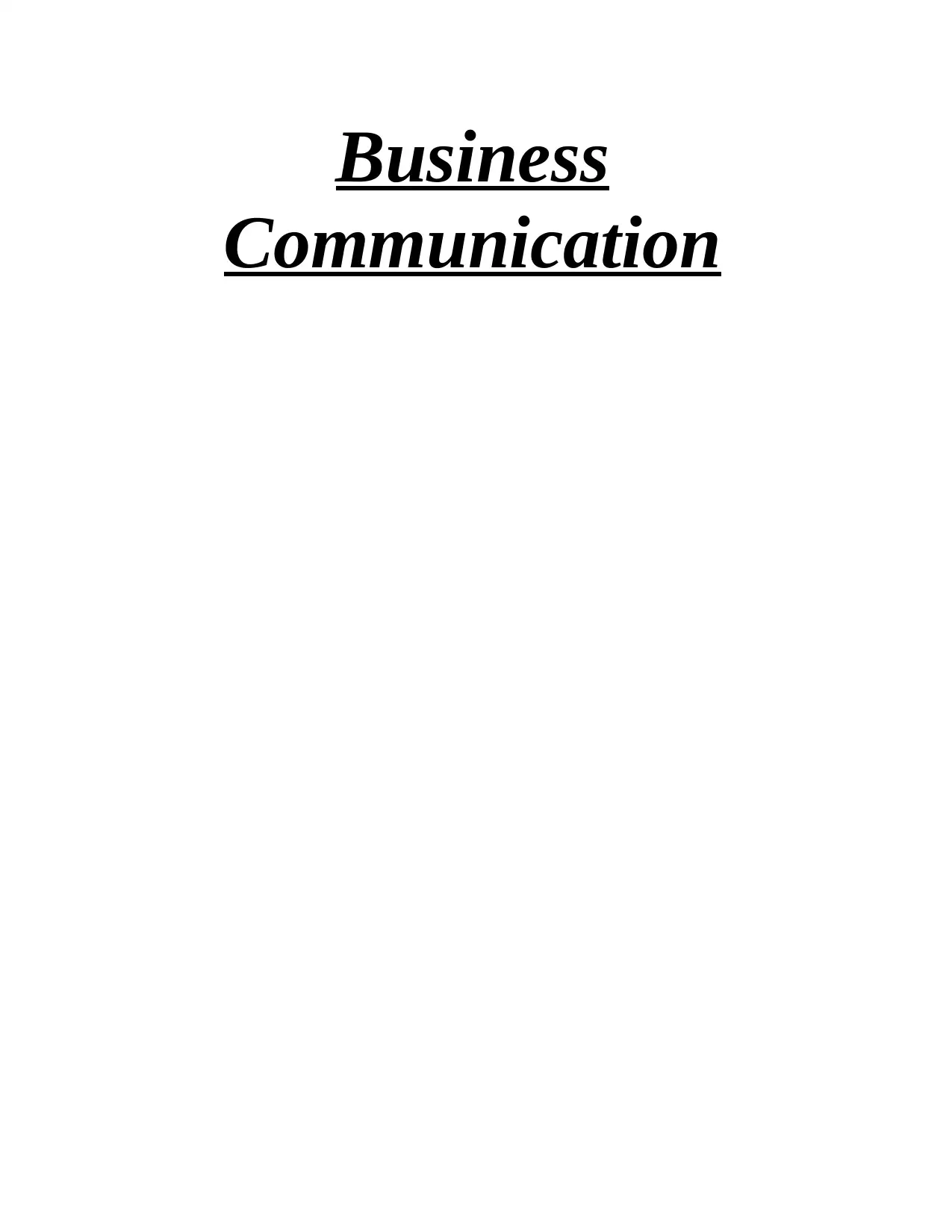
Business
Communication
Communication
Paraphrase This Document
Need a fresh take? Get an instant paraphrase of this document with our AI Paraphraser
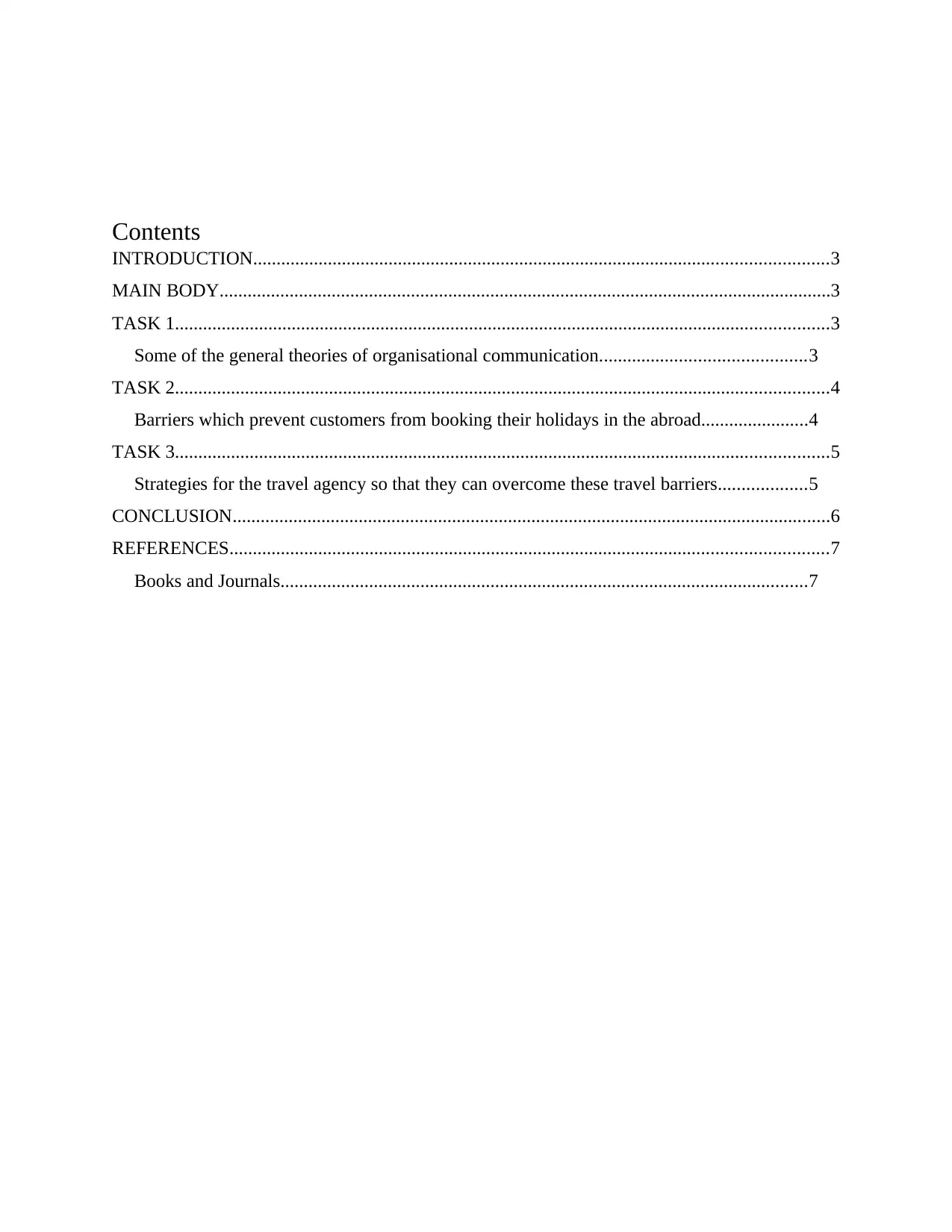
Contents
INTRODUCTION...........................................................................................................................3
MAIN BODY...................................................................................................................................3
TASK 1............................................................................................................................................3
Some of the general theories of organisational communication............................................3
TASK 2............................................................................................................................................4
Barriers which prevent customers from booking their holidays in the abroad.......................4
TASK 3............................................................................................................................................5
Strategies for the travel agency so that they can overcome these travel barriers...................5
CONCLUSION................................................................................................................................6
REFERENCES................................................................................................................................7
Books and Journals.................................................................................................................7
INTRODUCTION...........................................................................................................................3
MAIN BODY...................................................................................................................................3
TASK 1............................................................................................................................................3
Some of the general theories of organisational communication............................................3
TASK 2............................................................................................................................................4
Barriers which prevent customers from booking their holidays in the abroad.......................4
TASK 3............................................................................................................................................5
Strategies for the travel agency so that they can overcome these travel barriers...................5
CONCLUSION................................................................................................................................6
REFERENCES................................................................................................................................7
Books and Journals.................................................................................................................7
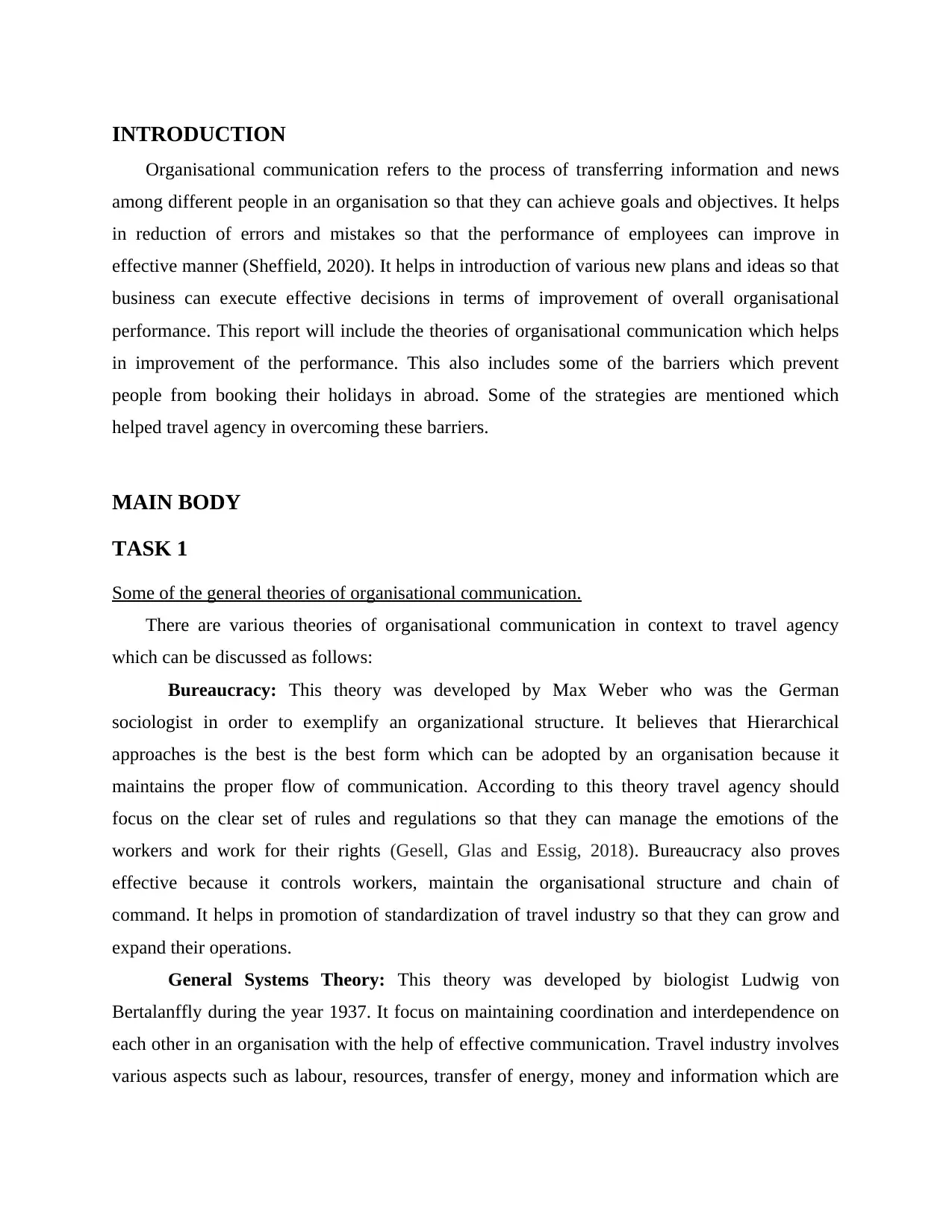
INTRODUCTION
Organisational communication refers to the process of transferring information and news
among different people in an organisation so that they can achieve goals and objectives. It helps
in reduction of errors and mistakes so that the performance of employees can improve in
effective manner (Sheffield, 2020). It helps in introduction of various new plans and ideas so that
business can execute effective decisions in terms of improvement of overall organisational
performance. This report will include the theories of organisational communication which helps
in improvement of the performance. This also includes some of the barriers which prevent
people from booking their holidays in abroad. Some of the strategies are mentioned which
helped travel agency in overcoming these barriers.
MAIN BODY
TASK 1
Some of the general theories of organisational communication.
There are various theories of organisational communication in context to travel agency
which can be discussed as follows:
Bureaucracy: This theory was developed by Max Weber who was the German
sociologist in order to exemplify an organizational structure. It believes that Hierarchical
approaches is the best is the best form which can be adopted by an organisation because it
maintains the proper flow of communication. According to this theory travel agency should
focus on the clear set of rules and regulations so that they can manage the emotions of the
workers and work for their rights (Gesell, Glas and Essig, 2018). Bureaucracy also proves
effective because it controls workers, maintain the organisational structure and chain of
command. It helps in promotion of standardization of travel industry so that they can grow and
expand their operations.
General Systems Theory: This theory was developed by biologist Ludwig von
Bertalanffly during the year 1937. It focus on maintaining coordination and interdependence on
each other in an organisation with the help of effective communication. Travel industry involves
various aspects such as labour, resources, transfer of energy, money and information which are
Organisational communication refers to the process of transferring information and news
among different people in an organisation so that they can achieve goals and objectives. It helps
in reduction of errors and mistakes so that the performance of employees can improve in
effective manner (Sheffield, 2020). It helps in introduction of various new plans and ideas so that
business can execute effective decisions in terms of improvement of overall organisational
performance. This report will include the theories of organisational communication which helps
in improvement of the performance. This also includes some of the barriers which prevent
people from booking their holidays in abroad. Some of the strategies are mentioned which
helped travel agency in overcoming these barriers.
MAIN BODY
TASK 1
Some of the general theories of organisational communication.
There are various theories of organisational communication in context to travel agency
which can be discussed as follows:
Bureaucracy: This theory was developed by Max Weber who was the German
sociologist in order to exemplify an organizational structure. It believes that Hierarchical
approaches is the best is the best form which can be adopted by an organisation because it
maintains the proper flow of communication. According to this theory travel agency should
focus on the clear set of rules and regulations so that they can manage the emotions of the
workers and work for their rights (Gesell, Glas and Essig, 2018). Bureaucracy also proves
effective because it controls workers, maintain the organisational structure and chain of
command. It helps in promotion of standardization of travel industry so that they can grow and
expand their operations.
General Systems Theory: This theory was developed by biologist Ludwig von
Bertalanffly during the year 1937. It focus on maintaining coordination and interdependence on
each other in an organisation with the help of effective communication. Travel industry involves
various aspects such as labour, resources, transfer of energy, money and information which are
⊘ This is a preview!⊘
Do you want full access?
Subscribe today to unlock all pages.

Trusted by 1+ million students worldwide
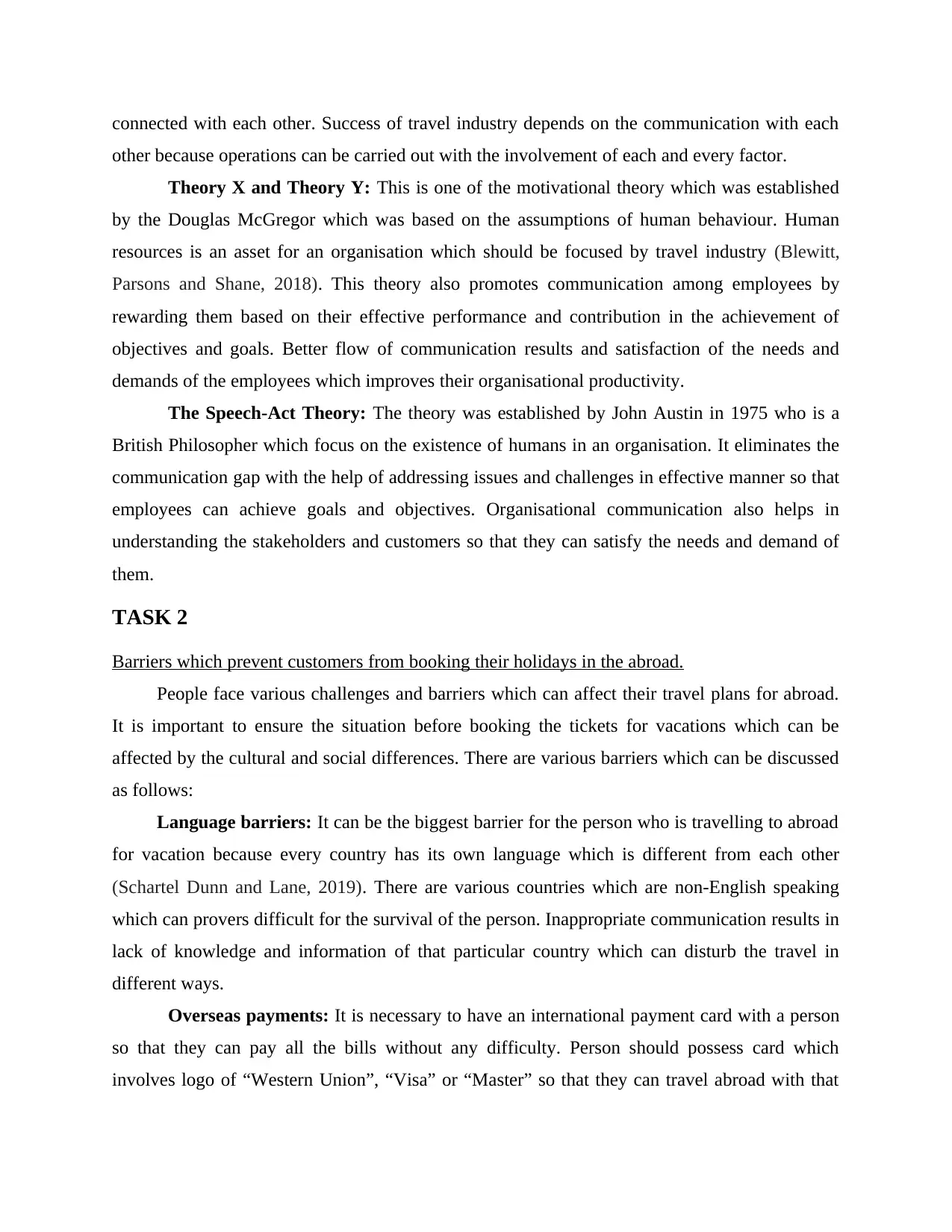
connected with each other. Success of travel industry depends on the communication with each
other because operations can be carried out with the involvement of each and every factor.
Theory X and Theory Y: This is one of the motivational theory which was established
by the Douglas McGregor which was based on the assumptions of human behaviour. Human
resources is an asset for an organisation which should be focused by travel industry (Blewitt,
Parsons and Shane, 2018). This theory also promotes communication among employees by
rewarding them based on their effective performance and contribution in the achievement of
objectives and goals. Better flow of communication results and satisfaction of the needs and
demands of the employees which improves their organisational productivity.
The Speech-Act Theory: The theory was established by John Austin in 1975 who is a
British Philosopher which focus on the existence of humans in an organisation. It eliminates the
communication gap with the help of addressing issues and challenges in effective manner so that
employees can achieve goals and objectives. Organisational communication also helps in
understanding the stakeholders and customers so that they can satisfy the needs and demand of
them.
TASK 2
Barriers which prevent customers from booking their holidays in the abroad.
People face various challenges and barriers which can affect their travel plans for abroad.
It is important to ensure the situation before booking the tickets for vacations which can be
affected by the cultural and social differences. There are various barriers which can be discussed
as follows:
Language barriers: It can be the biggest barrier for the person who is travelling to abroad
for vacation because every country has its own language which is different from each other
(Schartel Dunn and Lane, 2019). There are various countries which are non-English speaking
which can provers difficult for the survival of the person. Inappropriate communication results in
lack of knowledge and information of that particular country which can disturb the travel in
different ways.
Overseas payments: It is necessary to have an international payment card with a person
so that they can pay all the bills without any difficulty. Person should possess card which
involves logo of “Western Union”, “Visa” or “Master” so that they can travel abroad with that
other because operations can be carried out with the involvement of each and every factor.
Theory X and Theory Y: This is one of the motivational theory which was established
by the Douglas McGregor which was based on the assumptions of human behaviour. Human
resources is an asset for an organisation which should be focused by travel industry (Blewitt,
Parsons and Shane, 2018). This theory also promotes communication among employees by
rewarding them based on their effective performance and contribution in the achievement of
objectives and goals. Better flow of communication results and satisfaction of the needs and
demands of the employees which improves their organisational productivity.
The Speech-Act Theory: The theory was established by John Austin in 1975 who is a
British Philosopher which focus on the existence of humans in an organisation. It eliminates the
communication gap with the help of addressing issues and challenges in effective manner so that
employees can achieve goals and objectives. Organisational communication also helps in
understanding the stakeholders and customers so that they can satisfy the needs and demand of
them.
TASK 2
Barriers which prevent customers from booking their holidays in the abroad.
People face various challenges and barriers which can affect their travel plans for abroad.
It is important to ensure the situation before booking the tickets for vacations which can be
affected by the cultural and social differences. There are various barriers which can be discussed
as follows:
Language barriers: It can be the biggest barrier for the person who is travelling to abroad
for vacation because every country has its own language which is different from each other
(Schartel Dunn and Lane, 2019). There are various countries which are non-English speaking
which can provers difficult for the survival of the person. Inappropriate communication results in
lack of knowledge and information of that particular country which can disturb the travel in
different ways.
Overseas payments: It is necessary to have an international payment card with a person
so that they can pay all the bills without any difficulty. Person should possess card which
involves logo of “Western Union”, “Visa” or “Master” so that they can travel abroad with that
Paraphrase This Document
Need a fresh take? Get an instant paraphrase of this document with our AI Paraphraser
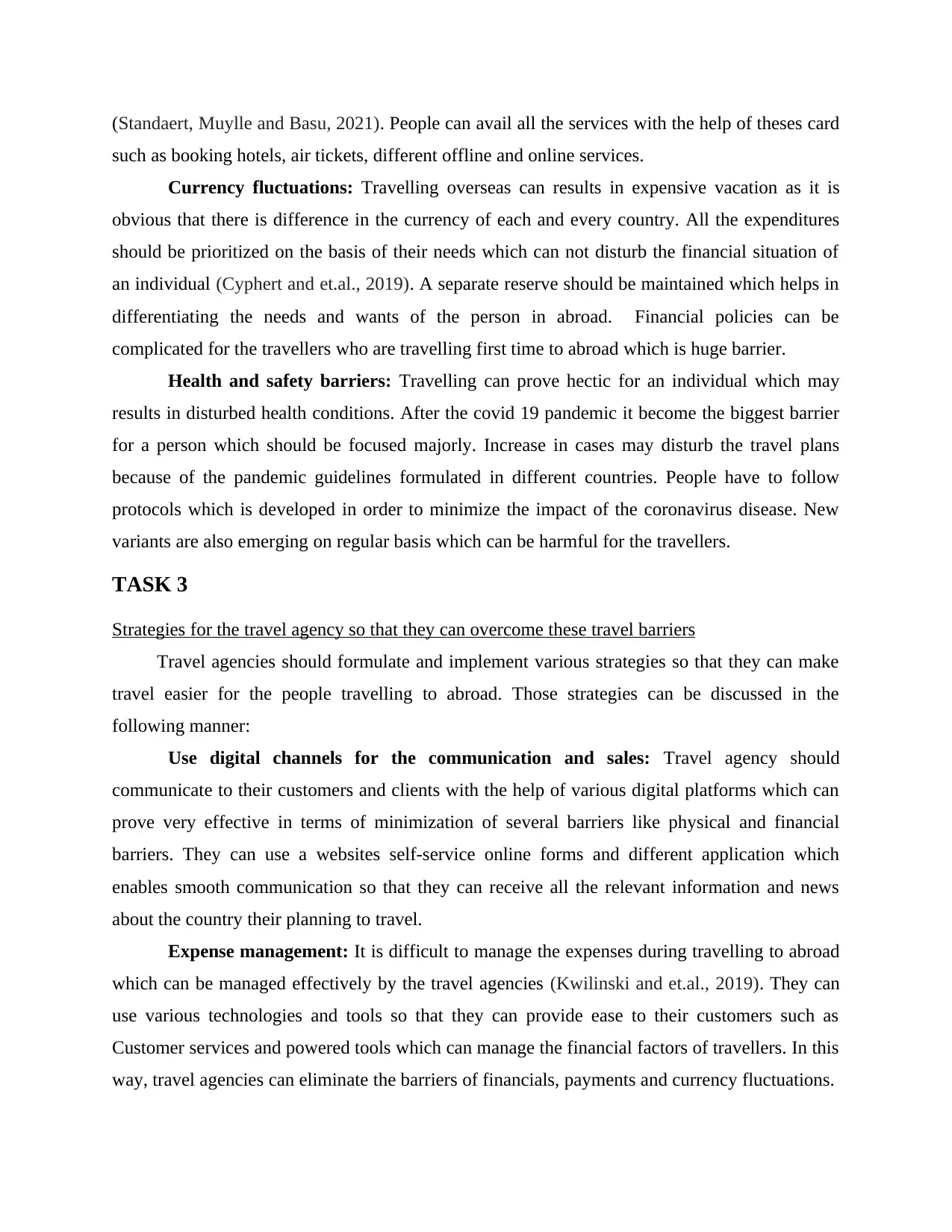
(Standaert, Muylle and Basu, 2021). People can avail all the services with the help of theses card
such as booking hotels, air tickets, different offline and online services.
Currency fluctuations: Travelling overseas can results in expensive vacation as it is
obvious that there is difference in the currency of each and every country. All the expenditures
should be prioritized on the basis of their needs which can not disturb the financial situation of
an individual (Cyphert and et.al., 2019). A separate reserve should be maintained which helps in
differentiating the needs and wants of the person in abroad. Financial policies can be
complicated for the travellers who are travelling first time to abroad which is huge barrier.
Health and safety barriers: Travelling can prove hectic for an individual which may
results in disturbed health conditions. After the covid 19 pandemic it become the biggest barrier
for a person which should be focused majorly. Increase in cases may disturb the travel plans
because of the pandemic guidelines formulated in different countries. People have to follow
protocols which is developed in order to minimize the impact of the coronavirus disease. New
variants are also emerging on regular basis which can be harmful for the travellers.
TASK 3
Strategies for the travel agency so that they can overcome these travel barriers
Travel agencies should formulate and implement various strategies so that they can make
travel easier for the people travelling to abroad. Those strategies can be discussed in the
following manner:
Use digital channels for the communication and sales: Travel agency should
communicate to their customers and clients with the help of various digital platforms which can
prove very effective in terms of minimization of several barriers like physical and financial
barriers. They can use a websites self-service online forms and different application which
enables smooth communication so that they can receive all the relevant information and news
about the country their planning to travel.
Expense management: It is difficult to manage the expenses during travelling to abroad
which can be managed effectively by the travel agencies (Kwilinski and et.al., 2019). They can
use various technologies and tools so that they can provide ease to their customers such as
Customer services and powered tools which can manage the financial factors of travellers. In this
way, travel agencies can eliminate the barriers of financials, payments and currency fluctuations.
such as booking hotels, air tickets, different offline and online services.
Currency fluctuations: Travelling overseas can results in expensive vacation as it is
obvious that there is difference in the currency of each and every country. All the expenditures
should be prioritized on the basis of their needs which can not disturb the financial situation of
an individual (Cyphert and et.al., 2019). A separate reserve should be maintained which helps in
differentiating the needs and wants of the person in abroad. Financial policies can be
complicated for the travellers who are travelling first time to abroad which is huge barrier.
Health and safety barriers: Travelling can prove hectic for an individual which may
results in disturbed health conditions. After the covid 19 pandemic it become the biggest barrier
for a person which should be focused majorly. Increase in cases may disturb the travel plans
because of the pandemic guidelines formulated in different countries. People have to follow
protocols which is developed in order to minimize the impact of the coronavirus disease. New
variants are also emerging on regular basis which can be harmful for the travellers.
TASK 3
Strategies for the travel agency so that they can overcome these travel barriers
Travel agencies should formulate and implement various strategies so that they can make
travel easier for the people travelling to abroad. Those strategies can be discussed in the
following manner:
Use digital channels for the communication and sales: Travel agency should
communicate to their customers and clients with the help of various digital platforms which can
prove very effective in terms of minimization of several barriers like physical and financial
barriers. They can use a websites self-service online forms and different application which
enables smooth communication so that they can receive all the relevant information and news
about the country their planning to travel.
Expense management: It is difficult to manage the expenses during travelling to abroad
which can be managed effectively by the travel agencies (Kwilinski and et.al., 2019). They can
use various technologies and tools so that they can provide ease to their customers such as
Customer services and powered tools which can manage the financial factors of travellers. In this
way, travel agencies can eliminate the barriers of financials, payments and currency fluctuations.
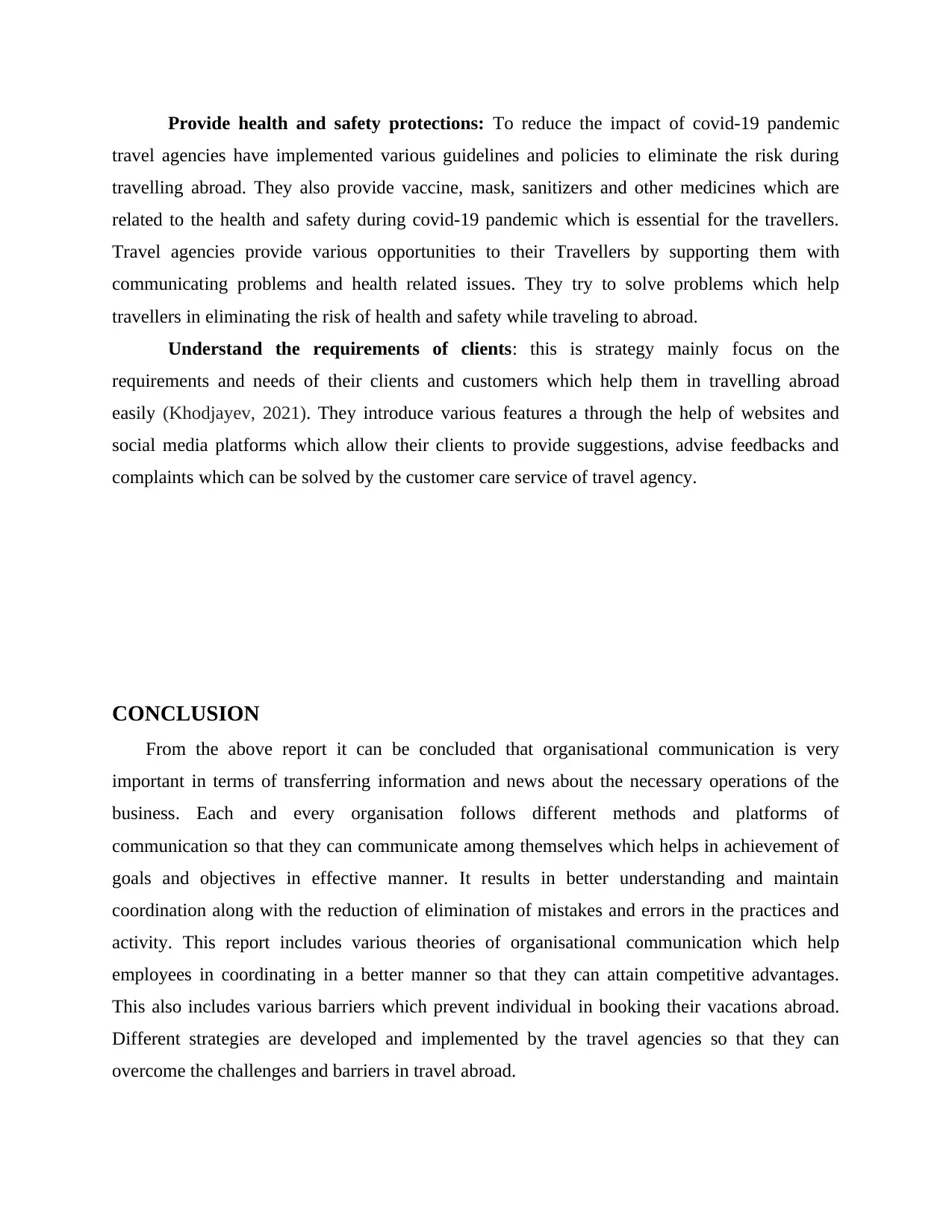
Provide health and safety protections: To reduce the impact of covid-19 pandemic
travel agencies have implemented various guidelines and policies to eliminate the risk during
travelling abroad. They also provide vaccine, mask, sanitizers and other medicines which are
related to the health and safety during covid-19 pandemic which is essential for the travellers.
Travel agencies provide various opportunities to their Travellers by supporting them with
communicating problems and health related issues. They try to solve problems which help
travellers in eliminating the risk of health and safety while traveling to abroad.
Understand the requirements of clients: this is strategy mainly focus on the
requirements and needs of their clients and customers which help them in travelling abroad
easily (Khodjayev, 2021). They introduce various features a through the help of websites and
social media platforms which allow their clients to provide suggestions, advise feedbacks and
complaints which can be solved by the customer care service of travel agency.
CONCLUSION
From the above report it can be concluded that organisational communication is very
important in terms of transferring information and news about the necessary operations of the
business. Each and every organisation follows different methods and platforms of
communication so that they can communicate among themselves which helps in achievement of
goals and objectives in effective manner. It results in better understanding and maintain
coordination along with the reduction of elimination of mistakes and errors in the practices and
activity. This report includes various theories of organisational communication which help
employees in coordinating in a better manner so that they can attain competitive advantages.
This also includes various barriers which prevent individual in booking their vacations abroad.
Different strategies are developed and implemented by the travel agencies so that they can
overcome the challenges and barriers in travel abroad.
travel agencies have implemented various guidelines and policies to eliminate the risk during
travelling abroad. They also provide vaccine, mask, sanitizers and other medicines which are
related to the health and safety during covid-19 pandemic which is essential for the travellers.
Travel agencies provide various opportunities to their Travellers by supporting them with
communicating problems and health related issues. They try to solve problems which help
travellers in eliminating the risk of health and safety while traveling to abroad.
Understand the requirements of clients: this is strategy mainly focus on the
requirements and needs of their clients and customers which help them in travelling abroad
easily (Khodjayev, 2021). They introduce various features a through the help of websites and
social media platforms which allow their clients to provide suggestions, advise feedbacks and
complaints which can be solved by the customer care service of travel agency.
CONCLUSION
From the above report it can be concluded that organisational communication is very
important in terms of transferring information and news about the necessary operations of the
business. Each and every organisation follows different methods and platforms of
communication so that they can communicate among themselves which helps in achievement of
goals and objectives in effective manner. It results in better understanding and maintain
coordination along with the reduction of elimination of mistakes and errors in the practices and
activity. This report includes various theories of organisational communication which help
employees in coordinating in a better manner so that they can attain competitive advantages.
This also includes various barriers which prevent individual in booking their vacations abroad.
Different strategies are developed and implemented by the travel agencies so that they can
overcome the challenges and barriers in travel abroad.
⊘ This is a preview!⊘
Do you want full access?
Subscribe today to unlock all pages.

Trusted by 1+ million students worldwide

Paraphrase This Document
Need a fresh take? Get an instant paraphrase of this document with our AI Paraphraser
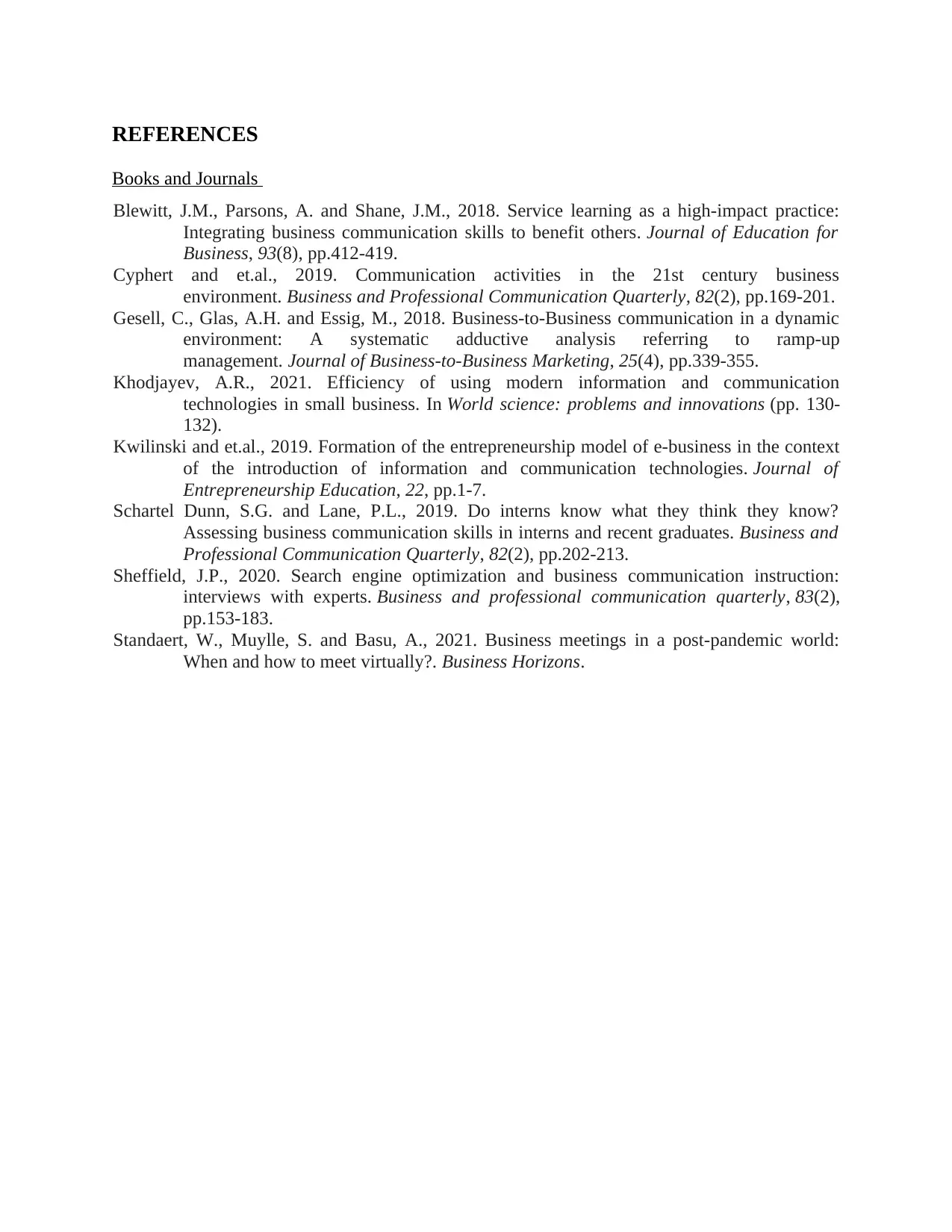
REFERENCES
Books and Journals
Blewitt, J.M., Parsons, A. and Shane, J.M., 2018. Service learning as a high-impact practice:
Integrating business communication skills to benefit others. Journal of Education for
Business, 93(8), pp.412-419.
Cyphert and et.al., 2019. Communication activities in the 21st century business
environment. Business and Professional Communication Quarterly, 82(2), pp.169-201.
Gesell, C., Glas, A.H. and Essig, M., 2018. Business-to-Business communication in a dynamic
environment: A systematic adductive analysis referring to ramp-up
management. Journal of Business-to-Business Marketing, 25(4), pp.339-355.
Khodjayev, A.R., 2021. Efficiency of using modern information and communication
technologies in small business. In World science: problems and innovations (pp. 130-
132).
Kwilinski and et.al., 2019. Formation of the entrepreneurship model of e-business in the context
of the introduction of information and communication technologies. Journal of
Entrepreneurship Education, 22, pp.1-7.
Schartel Dunn, S.G. and Lane, P.L., 2019. Do interns know what they think they know?
Assessing business communication skills in interns and recent graduates. Business and
Professional Communication Quarterly, 82(2), pp.202-213.
Sheffield, J.P., 2020. Search engine optimization and business communication instruction:
interviews with experts. Business and professional communication quarterly, 83(2),
pp.153-183.
Standaert, W., Muylle, S. and Basu, A., 2021. Business meetings in a post-pandemic world:
When and how to meet virtually?. Business Horizons.
Books and Journals
Blewitt, J.M., Parsons, A. and Shane, J.M., 2018. Service learning as a high-impact practice:
Integrating business communication skills to benefit others. Journal of Education for
Business, 93(8), pp.412-419.
Cyphert and et.al., 2019. Communication activities in the 21st century business
environment. Business and Professional Communication Quarterly, 82(2), pp.169-201.
Gesell, C., Glas, A.H. and Essig, M., 2018. Business-to-Business communication in a dynamic
environment: A systematic adductive analysis referring to ramp-up
management. Journal of Business-to-Business Marketing, 25(4), pp.339-355.
Khodjayev, A.R., 2021. Efficiency of using modern information and communication
technologies in small business. In World science: problems and innovations (pp. 130-
132).
Kwilinski and et.al., 2019. Formation of the entrepreneurship model of e-business in the context
of the introduction of information and communication technologies. Journal of
Entrepreneurship Education, 22, pp.1-7.
Schartel Dunn, S.G. and Lane, P.L., 2019. Do interns know what they think they know?
Assessing business communication skills in interns and recent graduates. Business and
Professional Communication Quarterly, 82(2), pp.202-213.
Sheffield, J.P., 2020. Search engine optimization and business communication instruction:
interviews with experts. Business and professional communication quarterly, 83(2),
pp.153-183.
Standaert, W., Muylle, S. and Basu, A., 2021. Business meetings in a post-pandemic world:
When and how to meet virtually?. Business Horizons.
1 out of 8
Related Documents
Your All-in-One AI-Powered Toolkit for Academic Success.
+13062052269
info@desklib.com
Available 24*7 on WhatsApp / Email
![[object Object]](/_next/static/media/star-bottom.7253800d.svg)
Unlock your academic potential
Copyright © 2020–2026 A2Z Services. All Rights Reserved. Developed and managed by ZUCOL.





